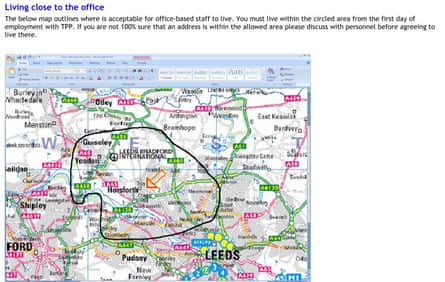The working culture at the Phoenix Partnership (TPP), which is responsible for 80m patient records in the UK and globally, is set by an exacting and eccentric array of company rules.
According to an employee handbook, typically issued to staff on their first day at the company, workers should avoid touching the office’s glass doors and those who leave fingerprints have to clean them off. Employees who are late for work are advised to “shout up your apology to the room”.
Staff at the company – run by Frank Hester, the Conservative party’s biggest donor – “must live within the circled area” of a map depicting a radius surrounding TPP’s office in Horsforth, Leeds, which excludes the city centre, to ensure they can get to the office quickly if an urgent issue arises.
When asked questions in meetings, hands should be raised “clearly and not in a half-hearted manner”, with this straight arm raising known informally within the company as “Phoenix hands”.
Employees are also told how to speak in the workplace. On entering a meeting room, they are instructed to “walk straight in” and “not to hover outside the door for any amount of time”. They are told: “Do not worry about being polite, just start talking to the person you need” and are instructed not to use phrases such as “sorry to interrupt”, or “could I bother you?”

Yawning or daydreaming during conversations, eating sandwiches at desks and using mobile phones or getting messages on smartwatches in the office are also not permitted.
The guide has evolved over time, with additions and updates. The handbook dating from 2014 said that failure to follow the rules may “warrant dismissal” – a warning that has now been removed.
One of its “core rules and values” in 2014 was the principle of “no bullshitting”, which is now understood to have been changed to an instruction to “be direct”. Employees are told to answer “yes or no” and never “I think so” or “sort of”.
While companies around the world have their own norms and bosses are entitled to set out their expectations for workers, former staff at TPP told the Guardian the handbook rules were unusual.
TPP’s lawyers, Carter-Ruck, said there was nothing unusual about a set of rules and that the handbook maintained high standards and took seriously the welfare of staff, citing early finishes on Fridays and the requirement to take holidays.
In the 2014 version of the rules, there was a long section on “mistakes made”, with staff urged to send a company-wide email confessing to errors, however trivial, with an explanation of how they happened and what could be learned.

This is understood to have been replaced with new rules, with employees told they must be open about any errors with an experienced member of staff, and that they would not get into trouble for making them, but that covering up mistakes was an extremely serious offence.
Lilly Marchesi, whose two-year stint working at TPP ended in 2014, said the rules were designed to streamline the way the company worked, but added: “If you made a mistake, you had to get everyone’s attention in a room and shout your mistake to the whole room. If you didn’t explain it directly and concisely enough, that was a punishable mistake in itself, this also had to be followed up by an email to all entitled ‘mistakes made’. It was very humiliating and degrading.”
She added: “I worked there for just under two years, but the stress of it is still something I think about now, nearly 10 years later.”
Another former staff member recalled that a “mistakes made” email contained a spelling error, prompting an hour-long discussion about whether a team member should send a mistakes made email about a mistakes made email.
TPP’s lawyers said the rules were subject to consultation and feedback with employees and that if former staff thought the rules were unreasonable, they could have raised this during their employment.
There are considerable perks for employees at TPP. Its website boasts “unrivalled starting salaries”, currently advertised at up to £60,000 for graduates, plus paid bar tabs.
Benefits include £300 towards a meal on your birthday, according to TPP’s careers website. In the 2014 handbook, it said that afterwards staff must send a company-wide email about where they went and “a bit about the occasion”. There have also been skiing holidays to the Alps and sailing trips to the British Virgin Islands and Croatia, paid for by the company.
TPP employed 250 people in 2015 and last year had 103 employees, its accounts show. At least 30% of staff left every year between 2014 and 2020, according to a calculation based on the number of internal emails about staff departures passed to the Guardian. In 2020, more than 40% of staff – 48 out of 115 – resigned or were fired or let go.
Some former workers claimed many graduates were hired only to be fired within weeks or months. TPP’s lawyers disputed that its turnover was high, saying two-thirds of staff had been with the company for more than five years and nearly three-quarters had chosen to stay for at least three years.
In 2019, Martin Mee was sacked from his job as a coder at TPP after being told in a letter, seen by the Guardian, that he was being suspended amid concerns over his conduct including an accusation that he “ignored Frank Hester” and two other employees.
In 2011 Josh O’Neill, a technical director, won a claim of unfair dismissal against TPP, which had fired him “on the pretext of misconduct”, according to an employment judge. The tribunal heard that Hester told a colleague “I’ll fucking sack him”, referring to O’Neill.
One former graduate employee, who left in 2020 after 18 months, said there were frequent dismissals during that time. “A new starter from my cohort was fired in just the first couple of weeks for reasons that were never disclosed. They assured us we had nothing to worry about if we were doing a good job and to trust in their decisions; those that were let go ultimately deserved it,” they said.
“Within two years our intake of over 20 was cut down to just three. During that time, I saw many colleagues and friends fired. Some, such as myself, took longer to find their feet again than others, but every single one has gone on to have a successful career in tech and beyond.”

Carter-Ruck said TPP would not comment on the circumstances in which any individual had been dismissed and it was inevitable in any workplace that some people leave because they are unhappy. A minority of ex-staff who could have an axe to grind did not represent the attitudes of current and former employees as a whole, it added.
Recruits at TPP were typically graduates who often joined the company fresh out of university with little sense of the uniqueness of TPP’s working culture, some former employees said.
“None of us really understood how weird it was until we moved into other jobs,” one said. Another added: “It was only afterwards I realised it wasn’t usual to cry all the time, not to be able to sleep, to have those panic attacks.”
A spokesperson for TPP said: “As the safe and trusted custodians of 80m medical records in the UK and around the world, we always hire the best people for the job, regardless of race, gender, sexuality or any other characteristic.
“We take care of our people and celebrate diversity in our workplace. We reward our staff well, encouraging them to work collaboratively, to take ownership of their responsibilities, and to demonstrate the commitment and professionalism that the NHS, patients and our customers around the world deserve.
“Having recently witnessed the tragic consequences that can be caused when software systems of major public services fail, we are proud to demand the highest standards of our staff to ensure we can continue to safely and reliably support our health service.”









